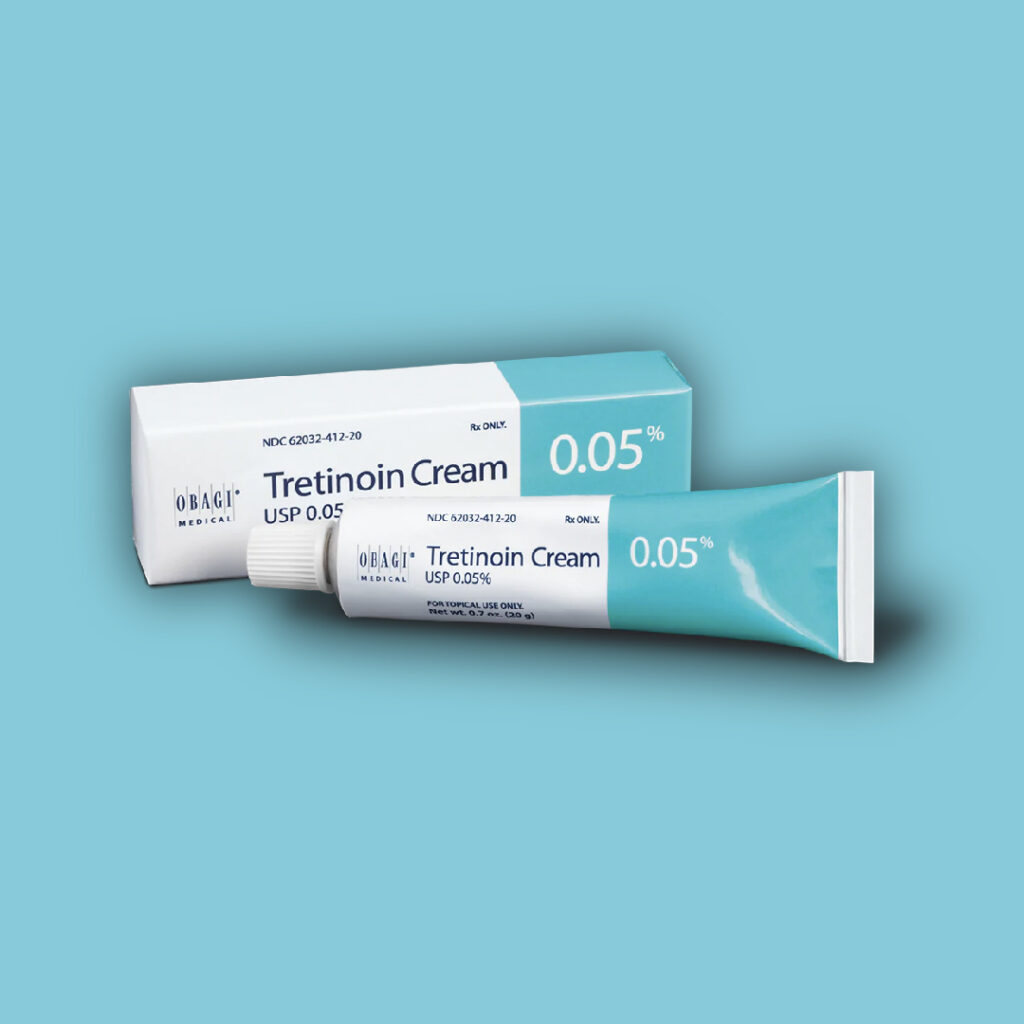
Should You Use Tretinoin as Part of Your Skincare Routine?
Tretinoin is one of the most popular and effective topical skin medications available to treat both acne, and signs of aging. Whether you are using topical tretinoin for the treatment of acne or for its anti-aging benefits, it is important to understand how to use this medication in order to get the best results.
What is Tretinoin?
Tretinoin, also known as retinoic acid, is a common medication that is prescribed to treat acne and sun-damaged skin. It is the generic name for synthetic vitamin A and is sold under several brand names (Retin-A being one of them). This medication has been prescribed for decades to effectively treat moderate acne because of its antibacterial properties.
Tretinoin comes as a topical cream or gel that is applied to the treatment area that is only available with a prescription for a healthcare provider.
How Tretinoin Works
Tretinoin is effective because it irritates the skin, thereby speeding up the turnover of skin cells. The cells divide and die faster so new, healthy cells take their place. This medication promotes fast exfoliation which stimulates the production of collagen and elastin. This results in smoother skin.
Research has shown that tretinoin can reduce inflammation due to acne, prevent plugging of skin follicles, and exfoliate the skin. Tretinoin can clear existing acne while also preventing future breakouts. Studies also indicate that tretinoin can:
- Reduce the appearance of fine lines and wrinkles
- Improve the appearance of sun-damaged skin
- Reduce dark spots
- Improve skin texture and tone
How to Use Tretinoin
Tretinoin should be applied to skin that has been gently washed and cleaned from all makeup. Avoid excessive washing and scrubbing which can cause irritation. Tretinoin can be applied 20 to 30 minutes after you have washed and dried your face. Only a small amount of create or gel should be used, and gently applied to the desired treatment area.
Limit UV Exposure: It is best to avoid UV exposure as much as possible when using this medication. Tretinoin degrades quickly when it is exposed to sunlight so it is best to apply it at night before bed, which gives it several hours out of the sunlight for it to start working. While using this medication, you should avoid exposure to the sun, extreme cold, and harsh soaps that could dry out and irritate the skin. Sunscreen should be used every day and limit the amount of time you are in the sun, particularly in the beginning of treatment, otherwise your skin might be sunburned quickly.
Use Moisturizer: A good moisturizer can alleviate dryness that may occur from the use of tretinoin. If your skin is dry, irritated, or flaky after using tretinoin, using a rich, alcohol-free moisturizer can alleviate dryness. Moisturizer should be applied between 20 minutes to an hour after tretinoin has been applied so the skin has time to absorb it.
When Tretinoin Should Not Be Used
While tretinoin is safe to use for many people, it is advisable to talk to your doctor about your skin condition and overall health. Those that are pregnant, or breastfeeding should talk to their doctor about the potential harm and benefit as there have not been enough studies to evaluate the use of tretinoin during pregnancy. Your doctor should also be made aware of the time you spend in the sun and any medications you are currently on.
Your medical professional will discuss if tretinoin is right for you given your health and lifestyle, as well as how it should be used.
Expected Results of Tretinoin
For most patients, tretinoin starts to work within two to three weeks, however, it can take up to six weeks or longer to see the full effect of the medication. Some patients have mild redness, peeling, or dryness in the first few weeks of using Tretinoin, known as the purging effect, but the side effects should lessen with time.
Finding the Right Concentration
While there may be some side effects to using tretinoin, they can be lessened by choosing the correct concentration for your skin. Topical tretinoin is available in strengths ranging from .01 percent to .1 percent. A study on the effectiveness of tretinoin therapy on acne found that by 12 weeks, there was an 80 percent reduction in clogged hair follicles at a 0.1 percent dosage and a 35 percent reduction with a 0.025 percent reduction. When used for anti-aging, tretinoin also needs about three months to show an improvement in fine wrinkles and thickening of the epidermal.
Be advised that your skin might look a little worse before it starts getting better. However, starting with a lower dosage of tretinoin can limit the side effects. A lower strength of 0.01 or 0.025 percent concentration will still start to get your skin used to the medication and can be increased to a higher strength if needed once the skin has had time to adapt.
Tretinoin as an Effective Skin Treatment
Effective and easy to use, tretinoin is one of the most widely used retinoids as a treatment for acne, sun spots and damage, and surface wrinkles. The key is to be consistent and patient with the results. Contact us today to find out if tretinoin can help your skin. We have all prescription strengths available at BB Aesthetic. One of our board certified healthcare professionals can help assess your skin to decide if this is right for you.












